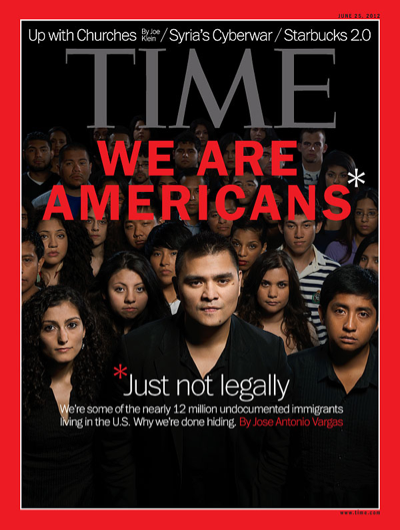On immigration, cutting the ties between enforcement and legalization

The cover of Time Magazine released on June 14 featured Pulitzer Prize winning journalist Jose Antonio Vargas and 35 other undocumented immigrants. The next day, Secretary of Homeland Security Janet Napolitano issued a memorandum that will, when implemented, grant deferred status and possibly work authorization to between 800,000 and 1.4 million undocumented people who meet age, education, and criminal history criteria. President Obama stepped out later that afternoon into the Rose Garden to add some Presidential love -- if not an executive order -- to the policy. It was a significant shift for someone who had, a year earlier, insisted it would be inappropriate for him to do exactly what he is now doing.
The debate started immediately over how Napolitano's deferred status memo will be carried out and what the policy shift means in the long run. That debate will continue for months to come. What the TIME Magazine cover and Napolitano memo does do, however, is put to rest once and for all the popular but dangerous notion that enforcement and legalization are tied together, tit for tat.
The "comprehensive" part of comprehensive immigration reform was, initially, an agreement that (1) increased enforcement would come with (2) increased pathways to citizenship. Then came a subtle but important shift: the conventional wisdom inside the beltway became that legalization will only come after enforcement is stepped up. It was an order of things created by Republicans and accepted by Democrats, making "enforcement first" one of the few policies -- immigration or otherwise -- with bipartisan support.
By 2008, this bipartisan consensus had changed the meaning of “comprehensive” to mean (1) increased border enforcement, (2) increased interior enforcement, (3) increased use of local police in enforcement, and (4) complete the danged fence.
Yet, inside-the-beltway immigration advocates doggedly continued to pretend that comprehensive immigration reform maintained its pre-2008 balance between enforcement and legalization. In this bubble of magical thinking, there still existed some kind of agreement that the pain of increased enforcement would, someday, be redeemable for expanded pathways to citizenship. As a matter of strategy, then, undocumented immigrants should accept the escalation in detention and deportations that comes with increased enforcement. In fact, the conventional wisdom suggests that stepping aside and allowing enforcement to run its course is a good idea, because only after the American people are convinced that the enforcement box has been checked off will legalization efforts move ahead.
The conventional wisdom got it wrong.
Acquiescing to increased enforcement turned out to be counter-productive. To justify nearly doubling enforcement spending in the midst of the long recession, the Obama Administration has ratcheted up its insistence that it is deporting "criminals," "criminal aliens," and otherwise nasty sounding people. To respond to the increasing criminalization of immigration enforcement by insisting "we are not criminals" only made matters worse. As professor of linguistics George Lakoff pointed out, being told "don't think of an elephant" brings to mind only elephants.
And then there's the problem with getting past that first part of enforcement first. Intensified immigration enforcement is embedded within a larger reality of intensified law enforcement. After thirty years of a domestic drug war that perpetuated itself through rhetoric about "tough on crime" and "zero tolerance," no amount of enforcement will be enough for those insisting on enforcement first. That enforcement box will never be checked off.
Enforcement and legalization are tied together, but not as a tit for a tat. The June 15 policy shift was not an award for acquiescence over enforcement. Quite the opposite. The shift happened only after repeated, direct challenges to enforcement. Community groups and advocacy organizations across the country called out first the 287(g) program and then Secure Communities for sucking hundreds of thousands of people into the deportation pipeline.
Others fought deportations one by one, blending social media and street protests to halt friends and family from being deported. DREAMers -- particularly those who risked deportation by insisting on getting arrested -- forced the question: are you really going to enforce immigration laws that prevent these young, talented individuals from becoming citizens?
When forced to make the choice publicly, the answer often turned out to be no. When the laws make it so that Jose Antonio Vargas and others like him are barred from legally becoming an American citizen, it brings into question the wisdom and morality of enforcing those laws at all.
The takeaway from this round, won by the DREAMers, is that directly fighting against the enforcement of bad laws will be what leads to expanded legalization. And so it may be that it's enforcement first after all, but as something to fight rather than something to concede.